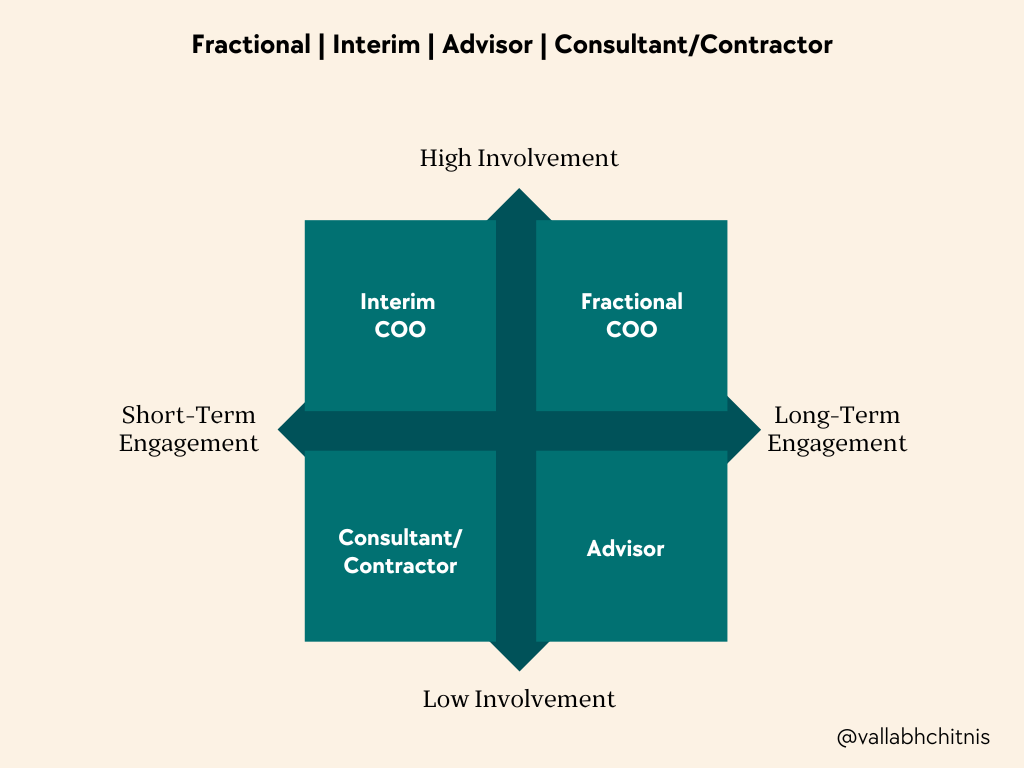At last month’s startup demo meetup, I was in a lively conversation with a group of startup founders during the post-demo networking event. One of them, with a curious look, asked, “So, you’re a Fractional COO? Isn’t that just a fancy term for a consultant?” Before I could answer, another founder corrected him,” No, it’s like being an advisor.”
The conversation highlighted a common confusion in the startup community—people often use terms like Fractional CxO, consultant, advisor, and others interchangeably, even though they serve very different purposes.
Here is a simple guide to breaking down the roles.
Fractional Roles
What it is: Fractional roles, like a Fractional COO, involve taking on executive-level responsibilities part-time. These professionals are deeply involved in strategy and operations but without the full-time commitment.
What it’s not: It is not a consultancy gig where someone comes in, gives advice, and leaves. Fractional roles are about being part of the leadership team, driving execution, and influencing outcomes over time.
In Demand: Fractional CFOs, CMOs, CPOs, and COOs are hot right now, especially in startups that need top-tier talent but can only afford a part-time executive.
Interim CxO
What it is: An interim COO temporarily steps into an executive role, often during transitions or crises. They assume full responsibility for the position until a permanent hire is made.
What it’s not: Interim CxOs are short-term solutions. Their role is to stabilize the company, ensure continuity, and hand off the role to a permanent executive once the transition is complete.
Advisor
What it is: Advisors provide strategic guidance over the long term. They are seasoned professionals who help you make better decisions by sharing their experience and insights.
What it’s not: Advisors don’t roll up their sleeves for operational tasks. They are not there to execute but to advise and steer from a high level.
Consultant
What it is: A consultant offers expert advice on specific issues. They are brought in to solve a problem, optimize a process, or provide insights on a particular aspect of the business, typically within a short timeframe.
What it’s not: A consultant isn’t a long-term partner in your business operations. They don’t stay involved in the day-to-day operations and aren’t responsible for implementation once their recommendations are delivered.
Freelancer/Independent Contractor
What it is: Freelancers or independent contractors are hired to complete specific tasks or projects. They bring specialized skills and flexibility to your team on a short-term basis.
What it’s not: A freelancer isn’t a strategic partner or someone who takes part in your company’s broader vision. They focus on delivering their assigned work without getting involved in your long-term goals.
As the future of work continues to evolve, fractional roles are becoming more prominent. They offer companies the flexibility to access top-level expertise without the full-time commitment. Fractional CFOs, CMOs, CPOs, and COOs are among the most sought-after roles, with future demand likely to grow.
Considering adding fractional expertise to your team? Whether you need strategic direction for a few days a month or help navigating a major transition, let’s connect.
#Advisory #Consulting #FractionaCPO #FractionalCOO #FractionalCxO #Leadership #Startups